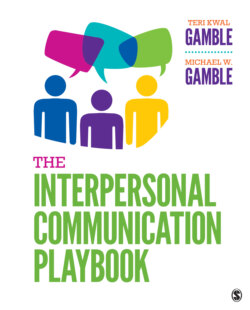Читать книгу The Interpersonal Communication Playbook - Teri Kwal Gamble - Страница 99
На сайте Литреса книга снята с продажи.
The Impact of Technology
ОглавлениеWe derive our sense of self not only from communicating face-to-face, but also from communicating online. By using technology, we participate in the creation of new worlds and new ways of finding out about ourselves. Interacting digitally, we can be ourselves or, at times, someone else—that is, we can exist as personas.
For some of us, the lives we live are more virtual than real. Some of us regularly inhabit virtual worlds, participating in simulations and assuming different personas. We may have a number of e-mail and Twitter accounts and various screen names as we use the digital domain to experiment with multiple identities—while concealing our real identities from both friends and strangers with whom we interact online.57 We might, for example, pose as a member of the opposite sex, conceal our age or ethnicity, hide physical characteristics, or otherwise pretend to be someone we are not. In other words, online we can be genderless, raceless, rankless, and appearanceless.58
We also can create parallel identities that facilitate the exploration of murkier aspects of the self, something very different from being an employee part of the day, a student another part of the day, and a family member at home. As psychologist Sherry Turkle notes, “The obese can be slender, the beautiful plain, the ‘nerdy’ sophisticated” due to the construction of an identity that is not part of their authentic selves. Turkle asserts that instead of developing internally, as a result of our being overly influenced by the opinions of others, the self is being externally manufactured. She contends that when we tweet and communicate via Facebook or Instagram, we are playing to the crowd—presenting a self that is based on what others respond to positively.59
How do manufactured images affect your sense of self?
FABRICE COFFRINI/AFP/Getty Images
Research shows that we try to present ourselves in as positive a light as possible online—especially, as we noted as the outset of this chapter, when using a social networking site such as Facebook. In effect, we psychologically boost our ego, enhancing our self-esteem.60 Some researchers, however, believe that Facebook has a dark side, in that it feeds users’ narcissistic tendencies by providing opportunities for self-promotion, access to shallow relationships and detached communication, and numerous self-solicitations for support.61 Other researchers disagree, contending that frequency of Facebook use is not associated with narcissism—a trait they assert applies only to those Facebook users who gather unrealistically inflated numbers of friends—but rather with greater openness and lower concern regarding privacy.62 For avid online game players, spending too much time online can result in depression and anxiety, because failing in game playing becomes as real as failing in real life.63
Researchers continue to weigh in on how life in the digital domain influences thoughts about identity. A 2017 survey of 1500 young people aged 14–24 suggests that social media platforms affect their sense of self including their body image—but in different ways. YouTube was found to have the most positive impact. In contrast, Facebook, Snapchat, Twitter, and Instagram demonstrated negative effects—with Instagram being the most negative particularly because of its ability to cause young women to compare themselves with curated, Photoshopped, unrealistic versions of reality.64 Among the most prevalent negative effects of social media was their tendency to contribute to feelings of anxiety and depression, leading to a lack of sleep, unhappiness with one’s appearance, increased bullying, FOMO, or not being present at social events that others frequented. Together, these contributed to decreased feelings of adequacy.65
Does your communication presence change when you go online? Does frequenting social media tend to make you more or less social? More or less inhibited? Do you act more or less authentic? Do you assume multiple identities, negotiate identities, or stay true to yourself? What have you learned about yourself by interacting with others online?
Analyze This: Media
In Sidney Lumet’s classic award-winning 1976 film Network, written by Paddy Chayefsky, the main character, a television news anchorman, speaks these words to his audience:
Television is not the truth. We lie like hell. . . . We deal in illusions, man. None of it is true. But you people sit there day after day, night after night. . . . We’re all you know. You’re beginning to think that the tube is reality and your own lives are unreal. You do what the tube tells you to do. You dress like the tube, you eat like the tube, you raise your children like the tube. In God’s name, you people are the real thing; we’re the illusion.
1 What does the preceding quotation suggest about our relationship with media? Substitute the words the internet for the tube. Does the quotation still ring true? Why or why not?
2 Compare and contrast the image you have of each of the following with the image portrayed in the media. Which image do you prefer and why?A nurseA lawyerThe policeA corporate executiveThe wealthyArabsTeenagersOlder people
3 Divide your life into three approximately equal segments. For example, if you are currently 21 years old, divide your life into the following segments: ages 1 to 7, 8 to 14, and 15 to 21. From each life segment, select a television program or film, song, book, and app or social networking site that you believe exerted a significant influence on your self-perception and interaction with others. For each of your selections, explain its significance and what it reveals about you.
4 If you could trade places with any media/YouTube/Instagram personality or character, who would it be and why?
Source: Quote from Network, written by Paddy Chayefsky, MGM and United Artists, 1976
